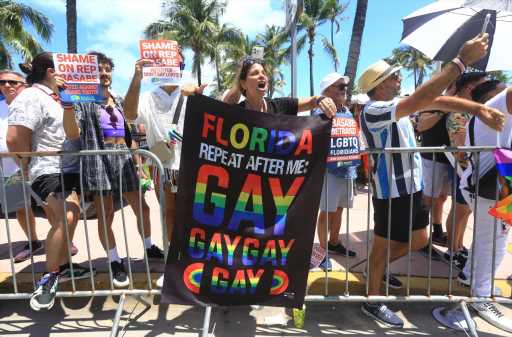Florida Lawmakers Voted to Expand 'Don't Say Gay' Restrictions — Here's Why That's So Dangerous
An expansion of Florida’s now-infamous ‘Don’t Say Gay’ law has passed in the state Senate and now heads to Gov. Ron DeSantis’s desk for approval. Here’s what that could mean for the health and wellbeing of LGBTQ+ youth in the Sunshine State.
As The Hill reported, an updated version of the law was approved this Wednesday (May 3). Formally known as the Parental Rights in Education law, the controversial measure — which prohibits virtually all classroom instruction related to the LGBTQ+ community for students in certain age groups — now applies to grades K–8. This week’s addendum also includes a process for banning books with queer themes from public school shelves.
DeSantis, a Republican, is a staunch supporter of the measure, so it’s almost guaranteed that he will approve it.
Although the law’s proponents claim it “promotes parental rights, transparency, and state standards,” LGBTQ+ advocates believe it is a clear attempt to silence and erase queer youth in Florida. (Many folks also think DeSantis is trying to galvanize his supporters by wading into a so-called culture war as he attempts to run for president.)
“The Don’t Say LGBTQ law has already caused sweeping damage across our state,” Jon Harris Maurer, public policy director of the advocacy group Equality Florida, told The Hill. “It was wrong when it was adopted, and expanding it is wrong now.”
-
When was the original Don’t Say Gay law passed?

Image Credit: Getty Images The first iteration of Florida’s Don’t Say Gay law was passed last March — and met with instant, widespread criticism from LGBTQ+ advocates and legal experts alike. At the time, it only applied to grades K–3.
Since last year, this law has made public school a hostile environment for young, queer Floridians. They are no longer allowed to openly discuss their gender identity or sexual orientation. In fact, under the law, teachers are explicitly barred from using trans and nonbinary students’ correct names and pronouns.
In Florida high schools — so, grades 9–12, which are not included in the law’s sweeping ban on LGBTQ+ classroom instruction — teachers cannot discuss queer topics unless it is deemed “age appropriate or developmentally appropriate.” If that language sounds vague to you, that’s by design.
-
Here’s how this law harms LGBTQ+ youth.

Image Credit: Getty Images Under this updated version of the law, even more young, queer Floridans run the risk of missing out on vital information about their sexual health and the history of their community.
America’s estimated 1.9 million LGBTQ+ youth already face substantial obstacles at school. They are more likely to be bullied, socially ostracized, and experience mental health issues than their cisgender, straight peers. A law politicizing their existence is the last thing they need.
-
This law is just one example of anti-LGBTQ+ state legislation in the U.S.

Image Credit: Getty Images Sadly, this expanded version of the Don’t Say Gay law is just the latest legislative attack on LGBTQ+ rights in America.
The ACLU is currently tracking 471 anti-LGBTQ+ bills in state legislatures across the country — and that’s just bills that were introduced this year. Florida alone is responsible for 10 bills, including legislation jeopardizing trans kids’ access to potentially life-saving gender affirming healthcare.
These bigoted attacks are demoralizing, but there are some ways to resist. In a previous interview with SheKnows, Equality Florida press secretary Brandon Wolf recommended emailing Florida Educator Commissioner Manny Diaz ([email protected]) to voice your opposition to the Don’t Say Gay expansion.
You can also amplify social media posts from groups like Equality Florida, which are doing vital work on the ground to protect the rights of LGBTQ+ Floridians.
Source: Read Full Article

